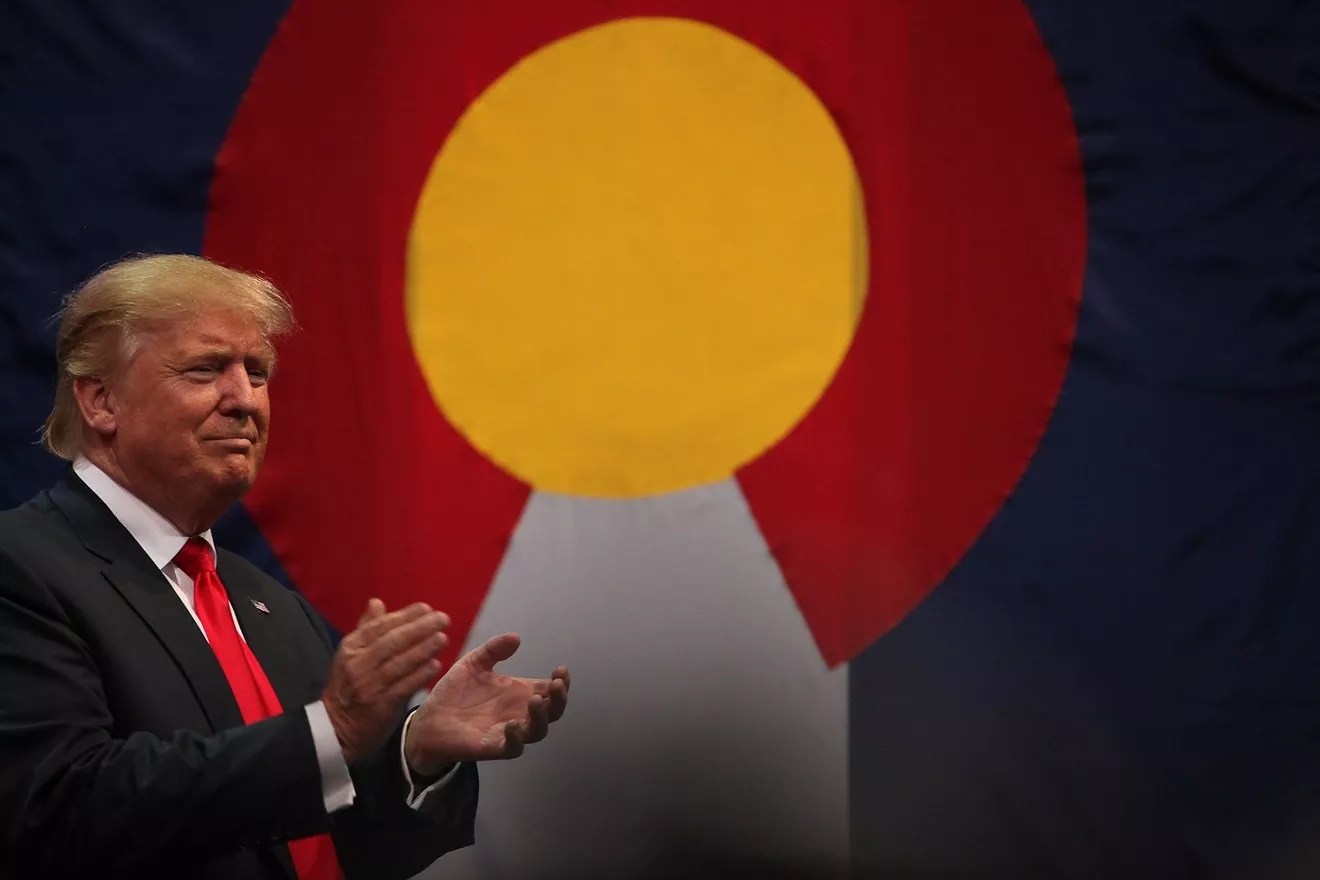
Brandon Marshall

Audio By Carbonatix
“Patriot,” greets former president Donald Trump in his first fundraising email of January 6, the third anniversary of the insurrection. “The U.S. Supreme Court has agreed to hear our ballot case this February. The highest court in the land will rule once and for all whether voters like YOU have the right to cast your ballot for ‘Donald J. Trump’ to Make America Great again!
“Make no mistake: this case goes beyond me….This battle will decide whether America is still a Republic where voters get to choose the president or whether we have LOST the freest nation in history to tyranny.”
On January 5, the U.S. Supreme Court announced that it would hear Trump’s appeal of the December 19 Colorado Supreme Court decision that, under the 14th Amendment of the U.S. Constitution, the former president is not eligible to be a candidate on the state’s presidential primary ballot. Arguments are set for February 8.
The amendment was adopted three years after the end of the Civil War, and while clearly inspired by that grim past, its language looked to the future: “No person shall be a Senator or Representative in Congress, or elector of President and Vice-President, or hold any office, civil or military, under the United States, or under any State, who, having previously taken an oath, as a member of Congress, or as an officer of the United States, or as a member of any State legislature, or as an executive or judicial officer of any State, to support the Constitution of the United States, shall have engaged in insurrection or rebellion against the same, or given aid or comfort to the enemies thereof. But Congress may by a vote of two-thirds of each House, remove such disability.”
In September, six Colorado voters – four Republican, two unaffiliated – filed suit against the Colorado Secretary of State, claiming that the 14th Amendment prohibited Trump from running for president again because of his involvement in the events of January 6, 2021. While a Denver district judge agreed that Trump had incited the insurrection, she also determined that the position of president was not an “officer of the United States.”
In a 4-3 decision, the Colorado Supreme Court disagreed, saying that an occupant of the highest office in the land qualified as an officer of the U.S. The majority ruling also accepted the Denver judge’s determination that Trump had engaged in an insurrection.
The Colorado Republican Party appealed that decision before the end of December; Trump followed suit on January 3…and the U.S. Supreme Court accepted the case two days later, even as other states – Illinois, Massachusetts – were collecting their own complaints regarding Trump’s eligibility.
Before the end of January 5, Secretary of State Jena Griswold – who’d been named the defendant in the original Colorado case not because of her politics, but her position – issued this statement: “Coloradans, and the American people, deserve clarity on whether someone who engaged in insurrection may run for the country’s highest office. I urge the Court to prioritize this case and issue a ruling as soon as possible.”
And then she preceded to certify the Republican and Democratic ballots for the March 5 primary election, in order to meet a hard deadline of January 5 and get overseas ballots mailed by January 20.
Had the U.S. Supreme Court announced yesterday that it had decided not to accept Trump’s appeal, his name would have been left off the ballot. Now, if the U.S. Supreme Court sides with the Colorado Supreme Court’s decision, primary votes for Trump will not be counted in this state. And if the justices decide against the Colorado Supreme Court, essentially putting an end to similar suits?
Trump could be on his way to securing the Republican Party nomination.
Under Colorado law, voters who are affiliated with a major party by February 12 will receive the primary ballot of that party. All unaffiliated voters will receive ballots for both parties, but can only vote for one. Here are the candidates who submitted their statements of intent and filing fees, and were certified by Griswold’s office to appear on the Colorado presidential primary ballots (in order):
Democratic Party Candidates: Jason Michael Palmer, Gabriel Cornejo, Frankie Lozada, Dean Phillips, Stephen P Lyons, Marianne Williamson, Joseph R Biden Jr., Armando “Mando” Perez-Serrato, Noncommitted Delegate (per statute, a vote for the Noncommitted Delegate provides “a place on the primary ballot for electors who have no presidential candidate preference to register a vote to send a non-committed delegate to the political party’s national convention).
Republican Party Candidates: Vivek Ramaswamy, Asa Hutchinson, Nikki Haley, Ron DeSantis, Chris Christie, Ryan L. Binkley, Donald J. Trump.
Republican Write-in Candidates: Rachel Hannah “Mohawk” Swift, Walter Iwachiw
Colorado’s primary is set for Super Tuesday on March 5…the day after Trump is slated to go on trial in Washington, D.C., on charges of plotting to overturn the 2020 election and inciting the insurrection on January 6, 2021.
Three years ago today.